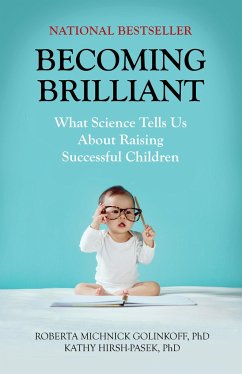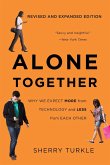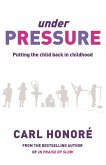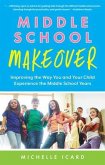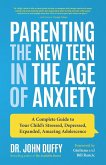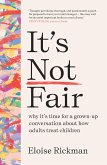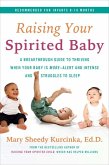Roberta Michnick Golinkoff, Kathy Hirsh-Pasek
Becoming Brilliant
What Science Tells Us about Raising Successful Children
Roberta Michnick Golinkoff, Kathy Hirsh-Pasek
Becoming Brilliant
What Science Tells Us about Raising Successful Children
- Broschiertes Buch
- Merkliste
- Auf die Merkliste
- Bewerten Bewerten
- Teilen
- Produkt teilen
- Produkterinnerung
- Produkterinnerung
Utilizing scientific insights, this guide empowers parents to nurture six essential skillsâ collaboration, communication, content, critical thinking, creative innovation, and confidenceâ to bridge the gap between traditional schooling and evolving career demands, paving the way for genuine success.
Andere Kunden interessierten sich auch für
![Alone Together Alone Together]() Sherry TurkleAlone Together19,99 €
Sherry TurkleAlone Together19,99 €![Under Pressure Under Pressure]() Carl HonoreUnder Pressure19,99 €
Carl HonoreUnder Pressure19,99 €![Middle School Makeover Middle School Makeover]() Michelle IcardMiddle School Makeover24,99 €
Michelle IcardMiddle School Makeover24,99 €![Parenting the New Teen in the Age of Anxiety Parenting the New Teen in the Age of Anxiety]() Dr. John DuffyParenting the New Teen in the Age of Anxiety18,99 €
Dr. John DuffyParenting the New Teen in the Age of Anxiety18,99 €![It's Not Fair It's Not Fair]() Eloise RickmanIt's Not Fair15,99 €
Eloise RickmanIt's Not Fair15,99 €![Raising Your Spirited Baby Raising Your Spirited Baby]() Mary Sheedy KurcinkaRaising Your Spirited Baby25,99 €
Mary Sheedy KurcinkaRaising Your Spirited Baby25,99 €![A+ Parenting A+ Parenting]() Eva MoskowitzA+ Parenting35,99 €
Eva MoskowitzA+ Parenting35,99 €-
-
-
Utilizing scientific insights, this guide empowers parents to nurture six essential skillsâ collaboration, communication, content, critical thinking, creative innovation, and confidenceâ to bridge the gap between traditional schooling and evolving career demands, paving the way for genuine success.
Produktdetails
- Produktdetails
- APA LifeTools Series
- Verlag: American Psychological Association
- Seitenzahl: 314
- Erscheinungstermin: 15. Mai 2016
- Englisch
- Abmessung: 216mm x 141mm x 20mm
- Gewicht: 402g
- ISBN-13: 9781433822391
- ISBN-10: 1433822393
- Artikelnr.: 44708486
- Herstellerkennzeichnung
- Libri GmbH
- Europaallee 1
- 36244 Bad Hersfeld
- gpsr@libri.de
- APA LifeTools Series
- Verlag: American Psychological Association
- Seitenzahl: 314
- Erscheinungstermin: 15. Mai 2016
- Englisch
- Abmessung: 216mm x 141mm x 20mm
- Gewicht: 402g
- ISBN-13: 9781433822391
- ISBN-10: 1433822393
- Artikelnr.: 44708486
- Herstellerkennzeichnung
- Libri GmbH
- Europaallee 1
- 36244 Bad Hersfeld
- gpsr@libri.de
Roberta Michnick Golinkoff, PhD, obtained her bachelor's degree at Brooklyn College, her PhD at Cornell University, and was awarded a postdoctoral fellowship at the Learning Research and Development Center of the University of Pittsburgh. She is the Unidel H. Rodney Sharp Professor of Education, Professor of Linguistics and Cognitive Science, and Professor of Psychological and Brain Sciences at the University of Delaware. She has won numerous awards for her work, including the John Simon Guggenheim Fellowship, the James McKeen Cattell Sabbatical Award, the Urie Bronfenbrenner Award for Lifetime Contribution to Developmental Psychology in the Service of Science and Society, and two awards from APA: the Award for Distinguished Service to Psychological Science and Distinguished Scientific Lecturer. With her long-standing colleague Kathy Hirsh-Pasek, Dr. Golinkoff was the 2 5 recipient of the James McKeen Cattell Fellow Award for lifetime contributions to applied psychological science. She routinely travels worldwide to speak to academic as well as lay groups. Having written more than 5 articles and books, monographs, and special journal issues, she is an expert on language development, playful learning, and early spatial knowledge. Three of her books are directed at parents and practitioners because she is passionate about dissemination. To bring the science of learning to the streets, Dr. Golinkoff cofounded the Ultimate Block Party movement to celebrate the science of learning. Kathy Hirsh-Pasek, PhD, is the Stanley and Debra Lefkowitz Distinguished Faculty Fellow in the Department of Psychology at Temple University and a Senior Fellow at the Brookings Institution. Her research examines the development of early language and literacy, as well as the role of play in learning. With her long-term collaborator, Roberta Michnick Golinkoff, she is the author of 4 books and hundreds of publications. She is the recipient of APA's Urie Bronfenbrenner Award for Lifetime Contribution to Developmental Psychology in the Service of Science and Society, Award for Distinguished Service to Psychological Science, and Distinguished Scientific Lecturer award, as well as the Association for Psychological Science's James McKeen Cattell Fellow Award. Dr. Hirsh-Pasek is a fellow of APA and the American Psychological Society and the president-elect of the International Society for Infant Studies. She has served as the associate editor of Child Development. Her book Einstein Never Used Flashcards: How Children Really Learn and Why They Need to Play More and Memorize Less won the prestigious Books for a Better Life Award as the best psychology book in 2 3. Dr. Hirsh-Pasek received her bachelor's degree from the University of Pittsburgh and her PhD from the University of Pennsylvania.
Acknowledgments
Introduction
Chapter 1: Redefining Success in the 21st Century
Chapter 2: The Learning Industry and the Learning Sciences: How Educational
Reform Sent Us in the Wrong Direction
Chapter 3: The Skills Needed for Success Are Global
Chapter 4: Hard Skills and "Soft Skills": Finding the Perfect Balance
Chapter 5: Collaboration: No One Can Fiddle a Symphony
Chapter 6: Communication: Lines of Connection
Chapter 7: Toppling the King That Is Content
Chapter 8: Critical Thinking: What Counts as Evidence?
Chapter 9: Creative Innovation: Rearranging the Old to Make the New
Chapter 10: Confidence: Dare to Fail
Chapter 11: A Report Card for the 21st Century
Epilogue: What If? The Reprise
Notes
Index
About the Authors
Introduction
Chapter 1: Redefining Success in the 21st Century
Chapter 2: The Learning Industry and the Learning Sciences: How Educational
Reform Sent Us in the Wrong Direction
Chapter 3: The Skills Needed for Success Are Global
Chapter 4: Hard Skills and "Soft Skills": Finding the Perfect Balance
Chapter 5: Collaboration: No One Can Fiddle a Symphony
Chapter 6: Communication: Lines of Connection
Chapter 7: Toppling the King That Is Content
Chapter 8: Critical Thinking: What Counts as Evidence?
Chapter 9: Creative Innovation: Rearranging the Old to Make the New
Chapter 10: Confidence: Dare to Fail
Chapter 11: A Report Card for the 21st Century
Epilogue: What If? The Reprise
Notes
Index
About the Authors
Acknowledgments
Introduction
Chapter 1: Redefining Success in the 21st Century
Chapter 2: The Learning Industry and the Learning Sciences: How Educational
Reform Sent Us in the Wrong Direction
Chapter 3: The Skills Needed for Success Are Global
Chapter 4: Hard Skills and "Soft Skills": Finding the Perfect Balance
Chapter 5: Collaboration: No One Can Fiddle a Symphony
Chapter 6: Communication: Lines of Connection
Chapter 7: Toppling the King That Is Content
Chapter 8: Critical Thinking: What Counts as Evidence?
Chapter 9: Creative Innovation: Rearranging the Old to Make the New
Chapter 10: Confidence: Dare to Fail
Chapter 11: A Report Card for the 21st Century
Epilogue: What If? The Reprise
Notes
Index
About the Authors
Introduction
Chapter 1: Redefining Success in the 21st Century
Chapter 2: The Learning Industry and the Learning Sciences: How Educational
Reform Sent Us in the Wrong Direction
Chapter 3: The Skills Needed for Success Are Global
Chapter 4: Hard Skills and "Soft Skills": Finding the Perfect Balance
Chapter 5: Collaboration: No One Can Fiddle a Symphony
Chapter 6: Communication: Lines of Connection
Chapter 7: Toppling the King That Is Content
Chapter 8: Critical Thinking: What Counts as Evidence?
Chapter 9: Creative Innovation: Rearranging the Old to Make the New
Chapter 10: Confidence: Dare to Fail
Chapter 11: A Report Card for the 21st Century
Epilogue: What If? The Reprise
Notes
Index
About the Authors

